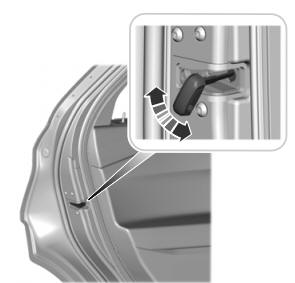Ford Explorer: Automatic Transmission - 10-Speed Automatic Transmission – 10R60 / Diagnosis and Testing - Preliminary Inspection
Overview
The preliminary inspection is part of Automatic Transmission Diagnosis. The preliminary inspection is used to find obvious causes of transmission concerns.
To correctly diagnose a concern, first understand the customer concern or condition. Customer contact may be required to understand the conditions, including when the concern occurs.
https://magicaliptv.com/iptv-free-trials/Underhood Inspection
-
Look for missing or damaged air induction components.
-
Inspect the wire harness for proper routing, especially near
the rear of the cylinder heads. Make sure the harness is not chafed or
pinched.
-
Inspect transmission fluid cooler for proper mounting and check for any missing air deflectors.
Under Vehicle Inspection
-
With the vehicle in NEUTRAL, position it on a hoist.
REFER to: Jacking and Lifting - Overview (100-02 Jacking and Lifting, Description and Operation).
-
Place the selector lever in D.
-
Inspect the transmission case for evidence of leaks.
-
Inspect the transmission fluid cooler lines for proper routing, pinches, or kinks.
-
Inspect the transmission fluid cooler mounting and check for any missing air deflectors.
-
Adjust the selector lever cable. (if equipped)
Transmission Fluid Inspection
Transmission fluid condition can provide many clues to the nature of the transmission concern. Proper transmission fluid level can only be determined with the transmission fluid within a specified temperature range. It is not necessary to verify exact transmission fluid level at this time. If the transmission fluid is below operating temperature, it is expected to be low on the transmission fluid level indicator. Transmission fluid temperatures below 30.2 °F ( -1 °C) may not show up on a transmission fluid level indicator.
-
With the vehicle in NEUTRAL, position it on a hoist.
REFER to: Jacking and Lifting - Overview (100-02 Jacking and Lifting, Description and Operation).
-
Remove the transmission fluid fill plug or the transmission fluid level indicator.
-
Allow the transmission fluid to drip onto a facial tissue or white sheet of paper.
-
Examine the stain. Under normal conditions, the fluid color
will darken and may develop an odor. Color and odor should not be used
to determine the condition of the fluid or transmission.
-
Trace amounts of black or shiny metallic particles may
be present from normal wear and operation. Presences of a few particles
in the sample do not necessarily indicate a transmission concern.
-
Large quantities of black particles are typically burnt friction material.
-
Large quantities of small to medium sized shiny metallic particles may indicate excessive hard part wear.
-
Foamy pink color indicates either water or engine coolant in the transmission.
-
Trace amounts of black or shiny metallic particles may
be present from normal wear and operation. Presences of a few particles
in the sample do not necessarily indicate a transmission concern.
Water in Transmission Fluid
To correctly repair an automatic transmission that has had water or coolant introduced into the system, completely disassemble, clean, and replace the following parts:
- All internal and external seals
- All friction material
- Torque converter
- All parts with bonded seals
- All solenoids
- All transmission fluid filters
Prior to installing the transmission, flush and clean the transmission fluid cooler(s) and the transmission fluid cooler tubes and hoses.
 Diagnosis and Testing - Diagnostic Strategy
Diagnosis and Testing - Diagnostic Strategy
Overview
The
diagnostic process for each transmission concern will vary depending on
the symptoms and condition of the vehicle. The diagnostic process
below is an efficient method to collect as mu..
 Diagnosis and Testing - Road Testing Vehicle
Diagnosis and Testing - Road Testing Vehicle
Shift Point Road Test
NOTE:
Always drive the vehicle in a safe manner according to driving conditions and obey all traffic laws.
Upshift Gear Sequence
At times the 10-speed transmission m..
Other information:
Ford Explorer 2020-2025 Service Manual: General Procedures - Air Conditioning (A/C) System Flushing - Vehicles With: R1234YF Refrigerant
Special Tool(s) / General Equipment Air Conditioning Flush and Purge Service Unit Air Conditioning Adaptor Kit Materials Name Specification Motorcraft® A/C System Flushing SolventYN-23 - Flushing NOTICE: Use the Refrigerant Identification Equipment before recovering any of the vehicle's refrigerant...
Ford Explorer 2020-2025 Service Manual: Removal and Installation - Fender Apron Panel Reinforcement
Special Tool(s) / General Equipment 6.5 mm Drill Bit Scraper for Straight Edges Polydrive Bit Socket Rivet Gun Belt Sander Torx Bit Socket Hot Air Gun Locking Pliers Materials Name Specification Metal Bonding AdhesiveTA-1, TA-1-B, 3M™ 08115, LORD Fusor® 108B - Seam SealerTA-2-B, 3M™ 08308, LORD Fusor® 805DTM - F..
Categories
- Manuals Home
- 6th Generation Explorer Owners Manual
- 6th Generation Explorer Service Manual
- General Procedures - Rear Camber Adjustment
- Body and Paint
- Body and Paint
- New on site
- Most important about car
Child Safety Locks
When these locks are set, you cannot open the rear doors from the inside.

A child safety lock is on the rear edge of each rear door. You must set the child safety lock separately on each door.
Left-Hand Side
